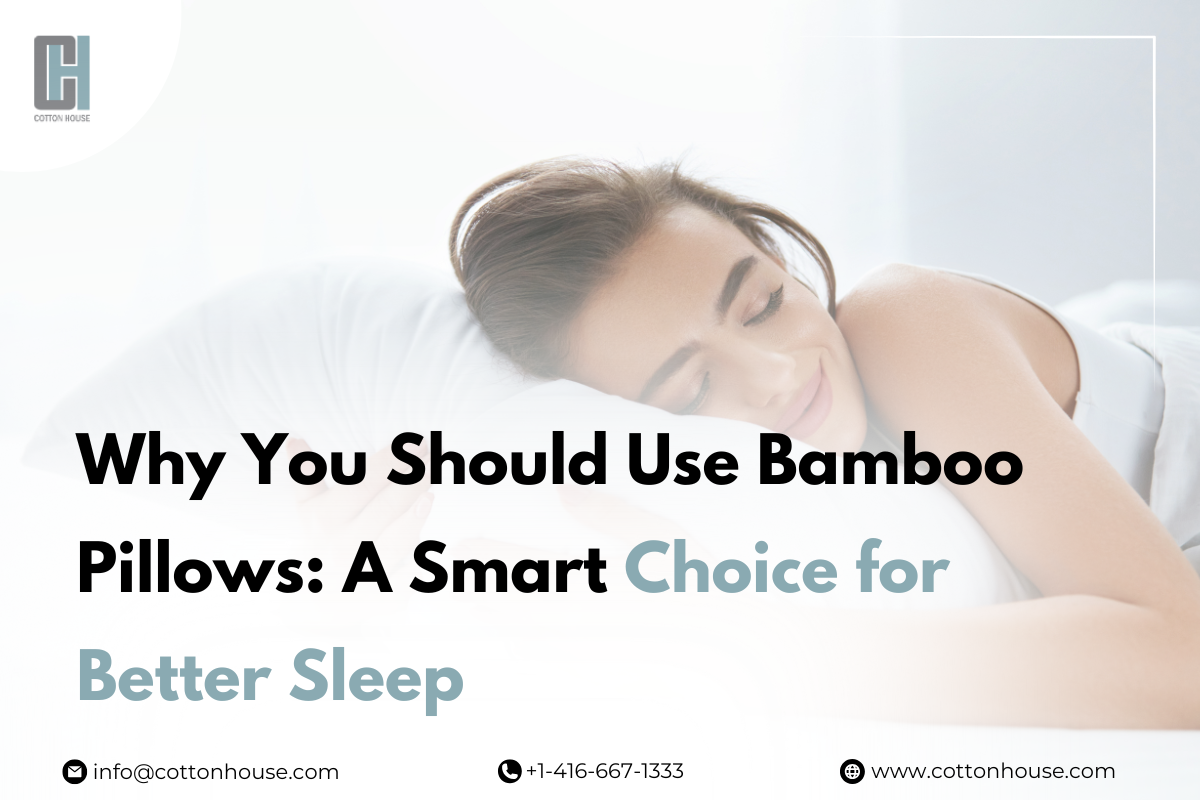
Still waking up with a sore neck or restless sleep? The problem might be hiding right under your head—your pillow. In recent years, bamboo pillows have become a game-changer in the world of sleep essentials, and for good reason. Designed with comfort, support, and health in mind, these pillows offer more than just a soft place to rest. From staying cool at night to being kind to sensitive skin, bamboo pillows benefits are hard to ignore. You might be wondering, “Are bamboo pillows good for me?” or “Why use bamboo pillows instead of the usual ones?”—and the answers lie in both their innovative materials and thoughtful design. Whether you’re seeking a sustainable sleep solution or better support with a bamboo memory foam pillow, this blog will walk you through everything you need to know.
What Is a Bamboo Pillow?
You might be asking, “What is a bamboo pillow?” Simply put, it’s a pillow made with a cover crafted from bamboo-derived fabric and usually filled with memory foam. This unique combination makes it both soft and supportive, offering a better sleep experience compared to traditional pillows.
The most popular type is the bamboo memory foam pillow, which uses either solid or shredded memory foam inside. This filling molds to the shape of your head and neck, providing excellent support and helping reduce pressure points. It’s especially useful as a bamboo pillow for neck pain, helping maintain proper spinal alignment while you sleep.
Another great advantage? Bamboo pillows are naturally resistant to dust mites, allergens, and bacteria, making them a top choice for people with allergies or asthma. If you’re looking for a hypoallergenic bamboo pillow, this is a smart and healthy option. In short, bamboo pillows combine comfort, support, and cleanliness—all in one.
Top Benefits of Bamboo Pillows:
When it comes to upgrading your sleep quality, bamboo pillows are becoming a favorite—and it’s easy to see why. Let’s explore the top bamboo pillows benefits and why making the switch could be the smartest move for your health and comfort.
Hypoallergenic and Ideal for Sensitive Skin:
One of the most loved features of bamboo pillows is their natural resistance to dust mites, mold, and other allergens. This makes them a perfect fit for people with asthma, allergies, or sensitive skin. The bamboo fabric is gentle and breathable, reducing skin irritation and creating a healthier sleep environment. If you’ve been wondering, “Are bamboo pillows good for allergy sufferers?”, the answer is a resounding yes!
Temperature Regulation and Breathability:
Do you often wake up hot and sweaty during the night? Bamboo fabric is known for its moisture-wicking and breathable qualities, helping to regulate your body temperature. It keeps you cool during summer nights and warm in the winter, making it comfortable year-round. This is one of the key reasons why use bamboo pillows instead of traditional ones—they adapt to your body’s needs naturally.
Eco-Friendly and Sustainable Material:
Bamboo is one of the fastest-growing and most sustainable plants on Earth. It requires less water and fewer chemicals to grow, making it a greener alternative to cotton or synthetic pillow covers. Choosing a bamboo pillow means you’re not just investing in your sleep—you’re also making a more environmentally conscious decision.
Superior Neck and Spine Support:
Thanks to the memory foam inside, a bamboo memory foam pillow contours perfectly to the shape of your head and neck. It provides the right amount of firmness and flexibility to support your spine’s natural alignment. If you suffer from stiffness or wake up sore, using a bamboo pillow for neck pain can make a real difference in your overall sleep quality.
Odor-Resistant and Antibacterial Properties:
Nobody likes a pillow that smells musty after a few uses. Bamboo fabric naturally resists odor and bacterial build-up, helping your pillow stay fresher for longer. This is especially great for those who want a clean, hygienic sleep surface without frequent washing.
Who Should Use a Bamboo Pillow?
Bamboo pillows are designed with comfort and wellness in mind, making them suitable for a wide range of sleepers. But who should use a bamboo pillow the most? If you fall into any of the categories below, it might be the perfect time to make the switch.
- People with Allergies or Sensitive Skin: The natural hypoallergenic and antibacterial properties of bamboo fabric help reduce irritation, making it a safe option for those with allergies or skin sensitivities.
- Hot Sleepers: If you tend to get hot and sweaty at night, a bamboo pillow’s cooling and moisture-wicking properties can help you stay dry and comfortable.
- People with Neck or Back Pain: A bamboo memory foam pillow provides targeted support for your neck and spine, making it a great choice for anyone suffering from discomfort or poor sleep posture.
- Eco-Conscious Shoppers: If you’re someone who cares about the environment, bamboo is one of the most sustainable materials available, making this an eco-friendly bedding option.
- Side, Back, and Stomach Sleepers: Bamboo pillows are available in various shapes and firmness levels, making them versatile enough to suit all sleep positions.
So, whether you’re chasing better sleep, better health, or a greener lifestyle, a bamboo pillow could be just what you need.
Bamboo Pillow vs Traditional Pillow: A Quick Comparison Table

How to Care for a Bamboo Pillow?
To keep your bamboo pillow fresh, comfortable, and long-lasting, a little care goes a long way. Here are some easy tips to help you maintain it properly:
Wash the Cover Regularly:
Most bamboo pillows come with a removable, machine-washable cover. Wash it every couple of weeks with mild detergent in cold water, then air dry or tumble dry on low.
Spot Clean the Foam:
The bamboo memory foam pillow itself usually shouldn’t go in the washing machine. Instead, spot clean any stains with a damp cloth and gentle soap. Let it air dry completely before use.
Fluff It Up:
If your pillow has shredded memory foam, fluff it regularly to maintain its shape and support. You can do this by kneading it or giving it a few gentle punches.
Let It Breathe:
Every now and then, place your pillow in a well-ventilated area to air it out. This helps release any trapped moisture and keeps it feeling fresh.
Avoid Harsh Chemicals:
Skip bleach or strong detergents, as they can damage the bamboo fibers and foam. Always follow the care instructions provided by the manufacturer.
Also Read: Bamboo pillows for neck pain
What to Look for When Buying a Bamboo Pillow?
Buying a bamboo pillow is a great step toward better sleep—but not all bamboo pillows are created equal. Here’s what to keep in mind to make sure you get one that fits your needs and offers great value:
1. Certifications to Check (CertiPUR-US, OEKO-TEX):
Always look for pillows that come with trusted certifications.
- CertiPUR-US: Ensures the memory foam is made without harmful chemicals and meets strict health and environmental standards.
- OEKO-TEX: Guarantees that the fabric is free from harmful substances and safe for human use.
These labels give peace of mind that you’re choosing a pillow that’s safe, clean, and responsibly made.
2. Adjustable vs Fixed Fill:
- Adjustable bamboo pillows allow you to add or remove shredded memory foam to customize the firmness and loft to your liking. Great for people who want more control over their comfort.
- Fixed fill pillows have a set amount of foam and may offer more consistent support but less flexibility.
- Think about whether you like a higher or lower pillow and whether you want to tweak it over time.
3. Warranty and Return Policy:
A good bamboo pillow should come with a decent warranty (usually 1–5 years) and a trial or return policy. This shows that the brand stands behind its product and gives you a chance to test it out risk-free.
4. Size and Loft Preferences:
Bamboo pillows come in different sizes (standard, queen, king) and various lofts (height/thickness).
- Side sleepers usually prefer a higher loft for neck support.
- Back sleepers might do better with a medium loft.
- Stomach sleepers often need a low-loft, softer pillow to avoid neck strain.
- Choose what feels most natural and supportive for your sleep style.
Conclusion:
If you’re looking to improve your sleep, support your health, and make a more eco-conscious choice, switching to a bamboo pillow is a smart move. From its cooling design to its ability to support your neck and spine, the bamboo pillows benefits truly stand out. Still wondering, “Are bamboo pillows good?” With their comfort, durability, and hypoallergenic properties—the answer is yes!
Whether you’re dealing with allergies and need a hypoallergenic bamboo pillow, suffering from stiffness and want a bamboo pillow for neck pain, or just want a breathable bamboo pillow that stays fresh and cool all night, there’s a perfect fit for everyone. The adaptable comfort of a bamboo memory foam pillow and its sustainable, skin-friendly fabric are just a few reasons why use bamboo pillows makes sense for modern sleepers.
FAQs
Are bamboo pillows good for people with neck pain?
Yes, bamboo pillows—especially ones with memory foam—offer great neck and spine alignment, which helps reduce stiffness and pain.
Do bamboo pillows get flat over time?
Bamboo pillows, especially shredded memory foam types, tend to retain their shape longer than traditional pillows, but occasional fluffing is recommended.
Are bamboo pillows safe for kids and babies?
While bamboo fabric is naturally hypoallergenic, it’s best to use age-appropriate pillows with proper supervision for infants and toddlers.
Can bamboo pillows be washed in a machine?
Usually, the outer bamboo cover is machine washable. However, the memory foam core should be spot-cleaned or hand-washed as per manufacturer guidelines.



